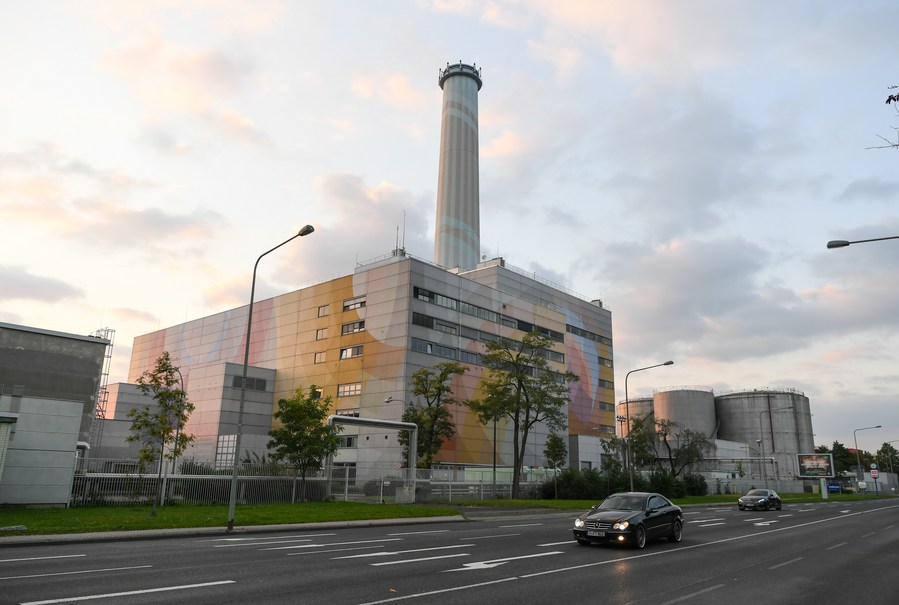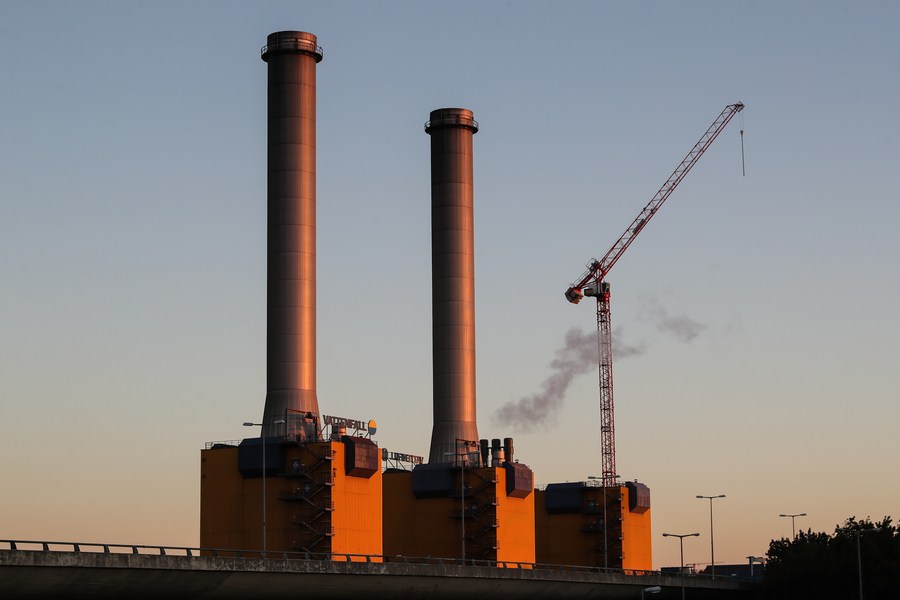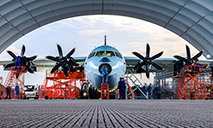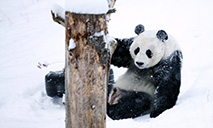Europe's bid to reduce reliance on Russia complicates gas crisis
-- European energy security has been a major concern as the region relies heavily on Russian gas, which accounts for around 40 percent of the EU's gas need.
-- Russia has repeatedly rebutted accusations that it attempts to withhold gas flows from Europe and exploit the supply crunch to its own benefit.
-- At the heart of the natural gas squabble between the EU and Russia is the controversial Nord Stream 2 pipeline project.

Photo taken on Oct. 8, 2021 shows a thermal power station in Frankfurt, Germany. (Xinhua/Lu Yang)
BRUSSELS, Dec. 29 (Xinhua) -- As the single largest supplier of natural gas in Europe, Russia has found itself on the receiving end of many a verbal outburst for soaring gas prices and a looming energy crisis.
The European benchmark TTF (Title Transfer Facility) front month gas price dipped to 132.58 euros (150 U.S. dollars) per megawatt hour (MWh) on Dec. 23 after setting a record high of 180.27 euros (204 dollars) per MWh on Dec. 21, a sign of high volatility of the natural gas market.
This has brought some relief to the jittery market, plagued by supply shortage and persistently elevated prices in the European Union (EU).
Russia has repeatedly rebutted accusations that it attempts to withhold gas flows from Europe and exploit the supply crunch to its own benefit. The EU should blame itself for the soaring gas prices, Russian President Vladimir Putin said Friday.

Photo taken on Oct. 9, 2021 shows stacks being torn down aiming to achieve carbon neutrality at the Berlin-Wilmersdorf power station in Berlin, capital of Germany. (Xinhua/Shan Yuqi)
OBLIGATIONS MET
Operators in Germany have found that the flows in pipelines through which natural gas runs from Russia to Europe were suspended in November when gas prices were hovering at high levels in Europe. The halt gave rise to suspicions that Russia intentionally withheld the supplies as a leverage to pursue its political interests in Europe.
The International Energy Agency (IEA) in September called on Russia to boost its supply to Europe to ease the price hikes.
"The IEA believes that Russia could do more to increase gas availability to Europe and ensure storage is filled to adequate levels in preparation for the coming winter heating season," the agency said in a statement.
Gazprom, Russia's state-owned energy corporation that has been supplying natural gas to Europe, has repeatedly dismissed the charges and stressed that all requests from its European customers have been met.
Accusations against Russia and Gazprom of insufficient natural gas supplies are "unacceptable and groundless," and the European countries created problems for themselves, Gazprom spokesman Sergei Kupriyanov said recently.
According to Kupriyanov, Gazprom is ready to supply additional volumes of gas under the existing long-term contracts at prices significantly lower than spot prices.
He said that this year in accordance with the contracts, Gazprom has supplied 50.2 billion cubic meters of natural gas to Germany, 5.3 billion cubic meters more than last year. Italy, Turkey, Bulgaria, Hungary, Serbia, Denmark, Finland and Poland are also among the countries to which Gazprom has increased gas supplies compared with last year.
In a press release, Gazprom said that gas sales to Germany, its biggest export market, rose by 16.8 percent year-on-year in the first 11 months of 2021.
All the contractual obligations in Europe, the Russian energy giant said, have been met and have not been disputed by its customers so far.

Vehicles are seen in heavy traffic in Brussels, Belgium, Oct. 8, 2021. (Xinhua/Zheng Huansong)
SPOT MARKET VS CONTRACTUAL DEALS
European energy security has been a major concern as the region relies heavily on Russian gas, which accounts for around 40 percent of the EU's gas need.
The EU has long been seeking to diversify its energy supply to reduce its dependence on Russian imports.
The EU countries' drive to make renewable energy the dominant form of energy production has led to the destabilization of the energy system and to a reduction in the use of natural gas and nuclear energy for electricity generation, said Igbal Guliyev, deputy director of the International Institute of Energy Policy and Diplomacy of Russia's MGIMO University.
"As a result, they have to use coal reserves to cover the shortfall of electricity, thus pushing up energy prices," Guliyev said.
Some EU countries have called on their companies to purchase natural gas on the spot market at market prices to avoid long-term contracts, some of which last 25 years.
Putin has, on various occasions, said that Russia was interested in long-term contracts and "long-term mutual obligations."
Whenever price hikes occur, contractual prices tend to be lower than spot prices. At his annual news conference on Thursday, Putin said that the long-term contract price is three to four, or even six to seven times cheaper than on spot.

Photo taken on Oct. 8, 2021 shows burning rings on a gas cooker in London, Britain. (Xinhua/Han Yan)
NORD STREAM 2 HANGS IN BALANCE
At the heart of the natural gas squabble between the EU and Russia is the controversial Nord Stream 2 pipeline project.
"Nord Stream 2 is faced with political and regulatory barriers, which will hinder Russia from increasing gas supplies to Europe," Guliyev said.
Nord Stream 2 links Germany directly with Russia via the Baltic Sea. Construction of the pipeline was completed in September. The new pipeline could enable Russia to double its gas exports to Germany by 110 billion cubic meters per year.
Unlike the pipelines in operation today, Nord Stream 2 pipeline bypasses Ukraine and has been under the spotlight due to strong opposition from the United States and other critics, who fear that the pipeline could deepen the EU's reliance on Russian natural gas.
Gazprom, the owner of Nord Stream 2, has filled the pipeline's first string with gas and started to conduct the gas-in procedure for the second string in December.
The pipeline, however, has been lying idle, pending a go-ahead from Germany and the EU.
On Nov. 16, Germany's network regulator said that it had suspended the pipeline's certification amid speculations that Nord Stream 2 would turn into a powerful geopolitical leverage for Russia.
However, German Chancellor Olaf Scholz has noted the economic orientation of the project, dissuading member countries from using the pipeline as a geopolitical bargaining chip.
Photos
Related Stories
Copyright © 2021 People's Daily Online. All Rights Reserved.










